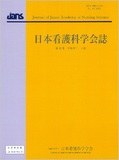Japanese
English
- 販売していません
- Abstract 文献概要
- 参考文献 Reference
- サイト内被引用 Cited by
要旨
目的:看護師の共感疲労について記述されている和・英文献より,看護師の共感疲労の概念と構造を明らかにすることを目的とした.
方法:和文献12件,英文件10件を分析対象とし,Walker&Avantの手法を用いた.
結果:属性5項目,先行要件7項目,帰結5項目を抽出し,看護師の共感疲労を「苦悩や苦痛を抱えた患者や家族に長期的,連続して共感的に関わり,看護の意味が見いだせない時に,倫理的葛藤に伴う無力感や罪悪感,身体的・精神的な不調,共感性の低下,深い疲労感,自尊心の低下を呈し,ケアの質の低下,離職などにつながる状態」と定義した.
結論:看護師にとって,共感は必要不可欠な要素であるが,リスクもある.看護師は,共感のリスクを認識し,共感疲労の知識を身につけ,対策を考えていく必要があることが示唆された.
Objective: This study aimed to clarify the concept and structure of compassion fatigue in nurses based on the relevant Japanese and English literature.
Methods: Twelve Japanese and ten English papers were reviewed using Walker and Avant's concept analysis approach.
Results: Five attributes, seven antecedents, and five consequences were extracted. Compassion fatigue in nurses was defined as "a state in which nurses are continuously involved empathically with patients and their families in distress and pain for a long period of time, and experience feelings of helplessness and guilt associated with ethical conflicts, physical and mental illness, decreased empathy, deep fatigue, and low self-esteem when they cannot find meaning in nursing, leading to decreased quality of care, leaving the job, etc."
Conclusion: Compassion is an essential element for nurses, but it is also a risk. The results of this study suggest that nurses need to be aware of the risk of compassion, acquire knowledge of compassion fatigue, and consider countermeasures.
Copyright © 2023, Japan Academy of Nursing Science. All rights reserved.


